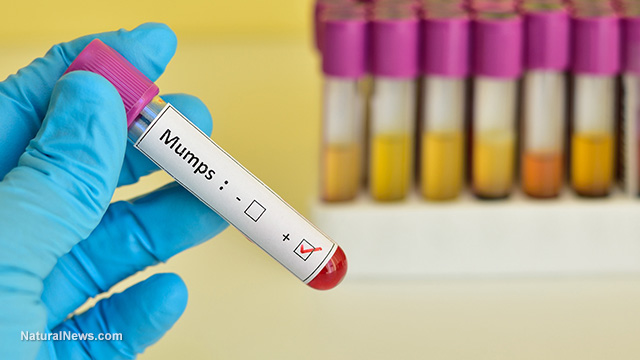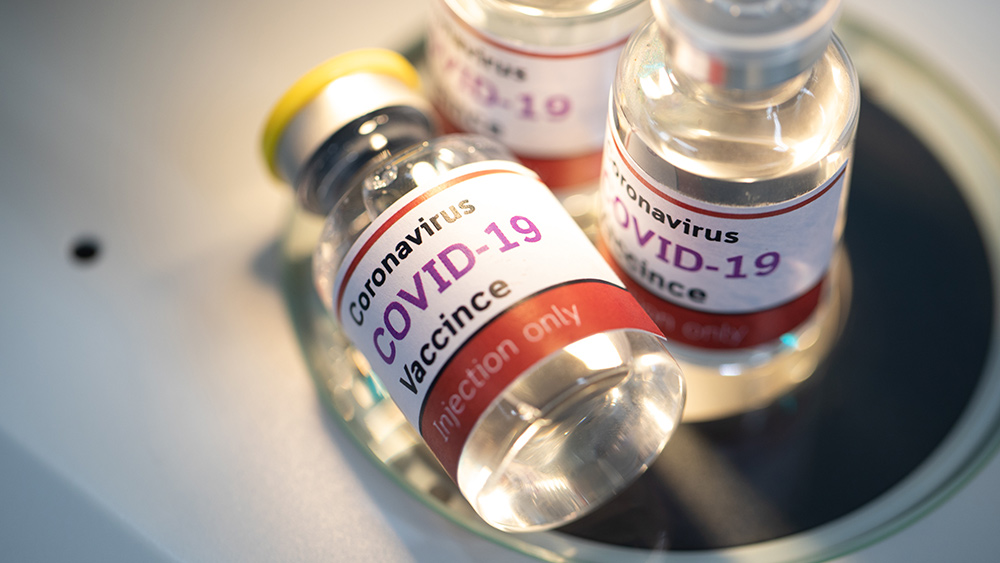Study: Mixing Pfizer and AstraZeneca vaccine doses CAUSES MORE side effects
10/07/2021 / By Ramon Tomey

A British study found that mixing and matching Wuhan coronavirus (COVID-19) vaccines could lead to more side effects. University of Oxford researchers discovered the issue in the Comparing COVID Vaccine Schedule Combinations (Com-COV) trial – the first in the world to look at mixing different COVID-19 vaccines. The Com-COV study focused on the Pfizer/BioNTech and AstraZeneca vaccines, which are both authorized for use in the United Kingdom.
The researchers found that people who received one vaccine candidate first followed by the other candidate had a higher chance of experiencing undesirable side effects than those who received two doses of the same vaccine. Based on their findings, 37 percent of volunteers who received an AstraZeneca dose followed by a Pfizer dose experienced chills. Meanwhile, 41 percent of volunteers who got a Pfizer dose first and an AstraZeneca dose afterward developed a fever.
On the other hand, only 10 percent of those who received two doses of the AstraZeneca vaccine and 21 percent of those who received two doses of the Pfizer vaccines reported having a fever.
According to the Com-COV trial data, which is set to be published in The Lancet next month, other side effects reported by those who received mixed doses of the two vaccines included fatigue, malaise, headache, joint pain and muscle ache. All symptoms, the study noted, were short-lived.
Both the AstraZeneca and Pfizer vaccines require two doses for complete protection. However, the two vaccines make use of different technologies. AstraZeneca’s vaccine, made in partnership with the University of Oxford, uses an adenoviral vector, while Pfizer’s vaccine, made in partnership with German firm BioNTech, uses messenger RNA (mRNA). The U.K.’s Medicines and Healthcare Products Regulatory Agency (MHRA) approved both vaccines for use in the country.
The vaccines by themselves are linked to serious reactions – mixing them only makes things worse
As per the British government’s guidance, people should ideally receive two doses of the same vaccine. However, in other countries like France, some people who initially received a dose of AstraZeneca’s vaccine have been offered the Pfizer vaccine for their second dose. Trials to see if combining two different vaccines can trigger stronger immunity against the coronavirus are ongoing.
As of writing, there is no data showing that mixing vaccine doses induces a more robust immune response to the Wuhan coronavirus.
In a briefing, vaccinologist and Com-COV chief investigator Dr. Matthew Snape said they are still unsure whether the higher rates of side effects they observed are indicative of a stronger response. “I personally would be surprised if that was the case, [but] we just don’t know what the outcome will be yet.” Snape has previously remarked that mixing vaccines carried the risk of causing a response that is not as good as in the original vaccine course.
Snape and his colleagues are now looking at mixing the Moderna and Novavax COVID-19 vaccines. Both of these vaccines also require two doses for protection. The MHRA approved Moderna’s mRNA vaccine for use in the country but has yet to give the Novavax adenovirus vaccine the green light.
The AstraZeneca and Pfizer/BioNTech vaccines have been linked to serious cardiovascular reactions. In Denmark, the AstraZeneca vaccine is associated with cases of brain hemorrhage. According to a report by The Hill, two health care workers experienced adverse reactions within 14 days of receiving their first shot.
The emergence of many similar reports led Denmark to discontinue vaccinations using the AstraZeneca vaccine. Back in April, Danish Health Authority Director General Soren Brostrom announced the decision to remove the AstraZeneca vaccine from Denmark’s mass vaccination program because “there is a real risk of severe side effects associated with using [it].”
Meanwhile in Israel, authorities investigated reports of heart lining and heart muscle inflammation in people who received the Pfizer/BioNTech vaccine. They identified 62 incidents of cardiac inflammation caused by the vaccine based on a study by the Israeli Ministry of Health. Two people died as a result of the adverse reaction while the rest recovered.
Pfizer confirmed in a statement that it is aware of the cardiac inflammation cases in Israel. However, it denied that its two-dose mRNA vaccine had anything to do with the adverse reactions. “We have not observed a higher rate of myocarditis than what would be expected in the general population. A causal link [between heart inflammations and] the vaccine has not been established,” the drug company said.
Visit VaccineInjuryNews.com to read more articles about the different COVID-19 vaccines and their adverse effects.
Sources include:
Tagged Under: AstraZeneca, Big Pharma, BioNTech, Com-COV trial, coronavirus vaccine, covid-19 pandemic, Pfizer, research, side effects, vaccine injury, vaccine safety, Wuhan coronavirus
RECENT NEWS & ARTICLES
COPYRIGHT © 2017 DISCOVERIES NEWS





















